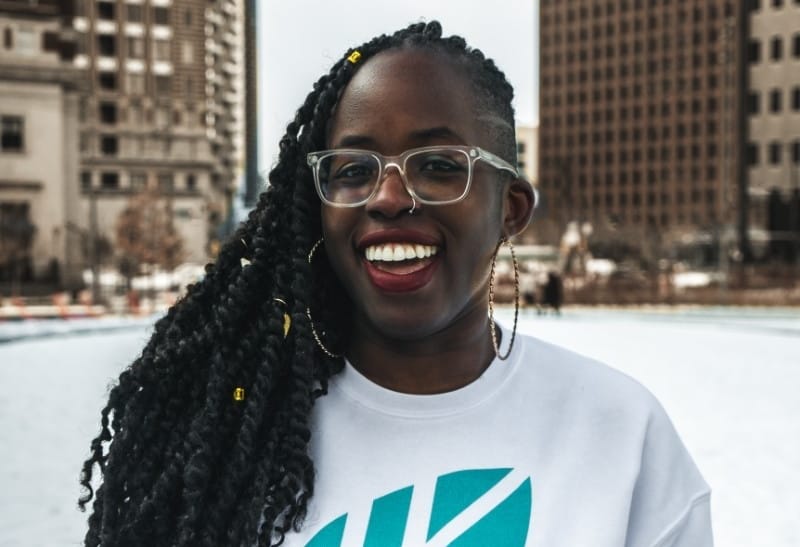Ruth Nakaar WG20 had the makings of an entrepreneur coursing through her veins long before she came to Wharton. The first-generation Ghanaian-American, who comes from a family of entrepreneurs, has always wanted to help entrepreneurs but never imagined she would become a part of the community herself. Her startup, Fudena, aims to be the first chain of fast-casual West African restaurants in the U.S.
Nakaar chatted with Penn’s Venture Lab on Twitter as part of the initiative’s #FounderFriday series to talk about the origins of her startup (which is also featured in the Spring/Summer 2021 issue of Wharton Magazine), how Penn and Wharton have helped her through the journey, and what community means at Fudena.
Venture Lab: Tell us a bit about yourself and what makes Fudena special.
Ruth Nakaar: I graduated from the Wharton School with my MBA in 2020 and started working on this project, something that I never in my wildest dreams thought I’d be doing. Fudena is the answer to a frustration that a lot of West Africans like myself have felt: finding quality, restaurant-style food that reminds us of home.
VL: Can you explain the origin of the name Fudena?
RN: Fudena is a play on the phrase “Fu di naa,” meaning “Have you eaten?” in Dagaare. Dagaare is the language spoken by the Dagaaba ethnic group that originates in the Upper West region of Ghana and southern region of Burkina Faso.

Fudena food bowls (Photo: Erica Xin)
VL: How has being a first-generation Ghanaian-American influenced your desire to pursue entrepreneurship?
RN: As the daughter of Ghanaian immigrants, there’s definitely a commitment and desire to succeed. There are a lot of stereotypes surrounding immigrant parents and their expectations for their children — pushing for careers in engineering, law, or medicine. But, fortunately, I never had that pressure placed upon me by my parents. They gave me license to choose my own path, and I’m grateful for their support. My mom has actually helped me cook several times. My dad is an entrepreneur — I guess that’s where it comes from — and I have relatives in Ghana who are entrepreneurs, so that’s a constant motivation for me.
VL: How do you persuade people who are unfamiliar with West African cuisine to try Fudena?
RN: The aim is to make the barrier as low as possible by adding in familiar elements. For example, we serve bowls that contain traditional foods like jollof rice and waakye with common Western foods like chicken and sweet potato. The hope is that that combination of different foods is more appealing to their palates.
VL: It’s worth nothing that you did all this during a global pandemic. How has COVID-19 impacted Fudena’s delivery-based business model?
RN: [Laughs] Yes, I launched during the pandemic. Initially, we started out as a ghost kitchen. For those who don’t know, a ghost kitchen is a commercial kitchen dedicated to the creation of virtual, delivery-only restaurant brands. Because this was built into our business model from the start, we didn’t have to change anything other than adhering to the new COVID food safety guidelines. With more people being home, the pandemic has accelerated the trend of delivery/pickup/takeout food options, and I don’t see that disappearing any time soon.
VL: Fudena seems to pride itself on building community. As a Philadelphia-based company, what is your vision for engaging the local community?
RN: Ooh, interesting question. Community means supporting each other, especially the Black diaspora. We aim to source a portion of our ingredients from Black-owned farms since less than 2 percent of farms in the U.S. are Black-owned. That’s an abysmal statistic that Fudena aims to change. Community is also about caring for people, which is why ”Fu di naa” is more than just the question “Have you eaten?” It signifies that you care about someone and their wellbeing.
VL: Can you tell us a bit about how Wharton supported you as a founder and business owner?
RN: Wharton has helped me in so many ways. In my admissions essays, I talked about wanting to help entrepreneurs, and here I am becoming an actual entrepreneur. Wharton provided me with the license and freedom to explore entrepreneurship as a viable path. Members of the community would attend tastings/focus groups I held in the group study rooms, fill out surveys, and really just believed in me and my vision. It gave me the confidence to believe in myself as a business owner, especially as a Black female founder.
Venture Lab hosts its #FounderFriday Twitter series via @vntrlab on Fridays at 11 a.m. ET. Join the conversations featuring entrepreneurs from across the Penn community by using the hashtag #venturelabchat.
Athena Panton W20 is the communications coordinator at Venture Lab. She also hosts her own podcast, What Happens In Between, to highlight the long, unsexy process of entrepreneurship.

























